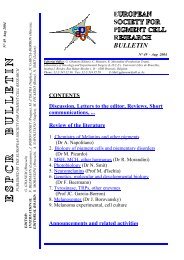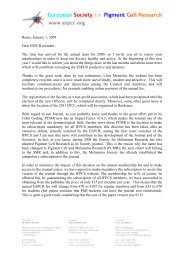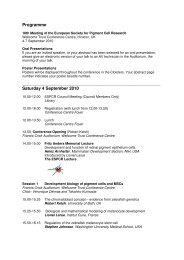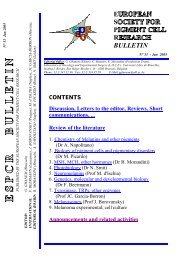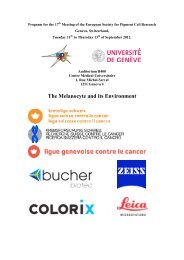espcrbulletin - European Society for Pigment Cell Research
espcrbulletin - European Society for Pigment Cell Research
espcrbulletin - European Society for Pigment Cell Research
Create successful ePaper yourself
Turn your PDF publications into a flip-book with our unique Google optimized e-Paper software.
3.. MSH,, MCH,, otther hormones,, diifffferenttiiattiion<br />
(Dr. R. Morandini)<br />
Takahashi studied the postranslational processing of proopiomelanocorting family molecules; in<br />
another paper the same authors described three proopiomelanocortin subtype genes and their<br />
expression in the barfin flounder pituitary. Another interesting paper also from the same authors,<br />
presented the « Evolution of Melanocortin systems in fish ».<br />
It is well known that α-MSH is produced through a processing of POMC. Eves at al. made an<br />
interesting review on the role of the alpha-Melanocyte stimulating hormone in the inflammation in<br />
human melanoma. This review considers the evolving biology of alpha-MSH and discusses its role in<br />
man that extend far beyond pigmentation of skin melanocytes, suggesting that the detoxifying role of<br />
alpha-MSH in inducing melanogenesis is only one aspect of the stress-coping role of this hormone.<br />
Many studies about the effect of alpha-MSH have been published lately such as:<br />
- Alpha-melanocyte stimulating hormone reduces putative stress-induced sickness behaviors in<br />
isolated guinea pig pups by Schiml-Webb;<br />
- Signaling pathways implicated in alpha-melanocyte stimulating hormone-induced lipolysis in<br />
3T3-L1 adipocytes by Cho KJ;<br />
- Effect of alpha-melanocyte-stimulating hormone on interleukin 8 and monocyte chemotactic<br />
protein 1 expression in a human retinal pigment epithelial cell line by Cui HS;<br />
It is interesting to point that α-MSH suppresses antigen-induced lymphocyte proliferation in humans<br />
independently of melanocortin 1 receptor gene status.<br />
(NDP)-alpha-MSH (α-MSH agonist) have been used to prolong allograft survival in experimental<br />
heart transplantation (paper by Colombo). The preliminary results seem to be very promising: the<br />
analog preserves heart function through a broad effect on multiple pathways and suggest that the<br />
peptide could improve the outcome of organ transplantation in combination with immunosuppressive<br />
treatments. These effects can be also explained partially because the analog is more stable than the<br />
native hormone.<br />
Regulation and signal transduction<br />
- Bonetto S, Carlavan I, Baty D.<br />
Isolation and characterization of antagonist and agonist peptides to the human melanocortin<br />
1 receptor. Peptides. 26(11):2302-2313, 2005.<br />
- Fung S, Hruby VJ.<br />
Design of cyclic and other templates <strong>for</strong> potent and selective peptide alpha-MSH analogues.<br />
Curr Opin Chem Biol. 9(4):352-8, 2005. Review.<br />
- Hill RP, Macneil S, Haycock JW.<br />
Melanocyte stimulating hormone peptides inhibit TNF-alpha signaling in human dermal<br />
fibroblast cells. Peptides. 2005 Nov 3.<br />
- Kelly JM, Moir AJ, Carlson K, Yang Y, Macneil S, Haycock JW.<br />
Immobilized alpha-melanocyte stimulating hormone 10-13 (GKPV) inhibits tumor necrosis<br />
factor-alpha stimulated NF-kappaB activity. Peptides. 2005 Nov 3.<br />
- Cho KJ, Shim JH, Cho MC, Choe YK, Hong JT, Moon DC, Kim JW, Yoon DY.<br />
Signaling pathways implicated in alpha-melanocyte stimulating hormone-induced lipolysis in<br />
3T3-L1 adipocytes. J <strong>Cell</strong> Biochem. 96(4):869-78, 2005.<br />
1417



